Module 1 Unit 2 Daily lifeGrammar一般现在时课件 (共18张PPT)
文档属性
| 名称 | Module 1 Unit 2 Daily lifeGrammar一般现在时课件 (共18张PPT) |
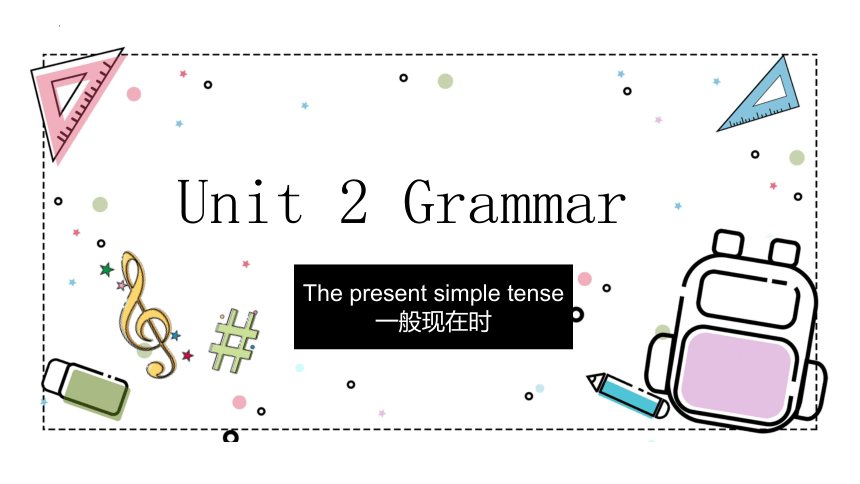
|
|
| 格式 | pptx | ||
| 文件大小 | 777.3KB | ||
| 资源类型 | 教案 | ||
| 版本资源 | 牛津深圳版 | ||
| 科目 | 英语 | ||
| 更新时间 | 2023-10-09 06:29:55 | ||
图片预览


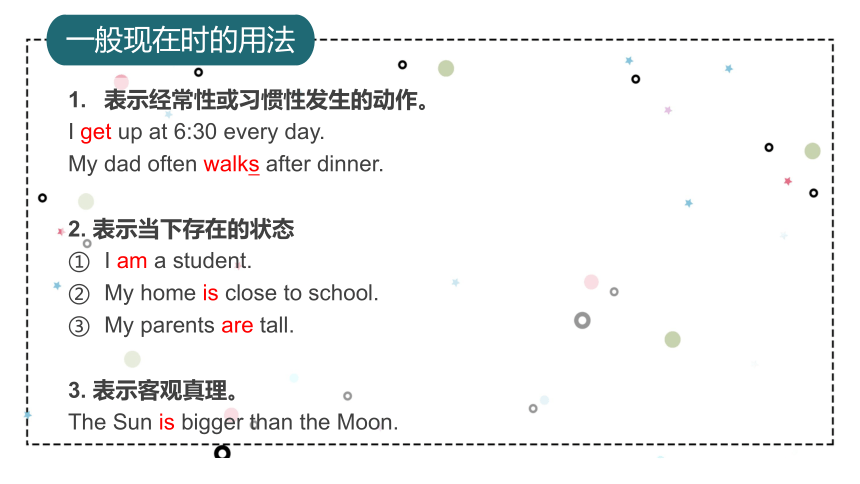
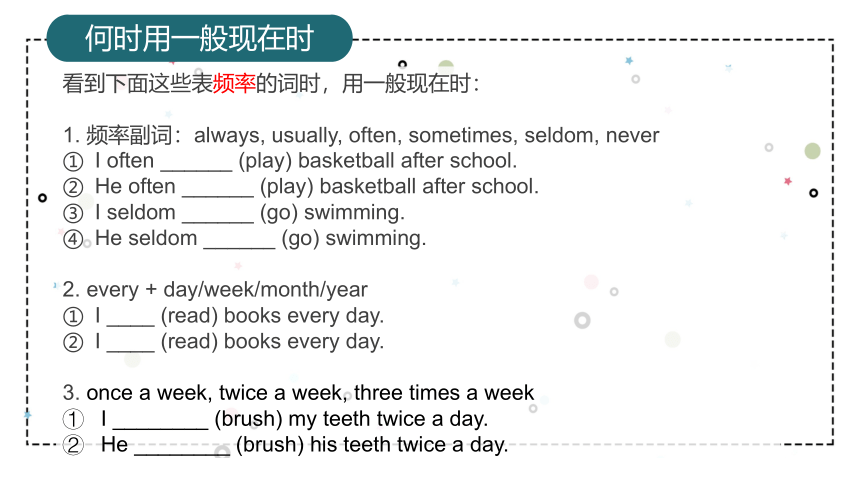
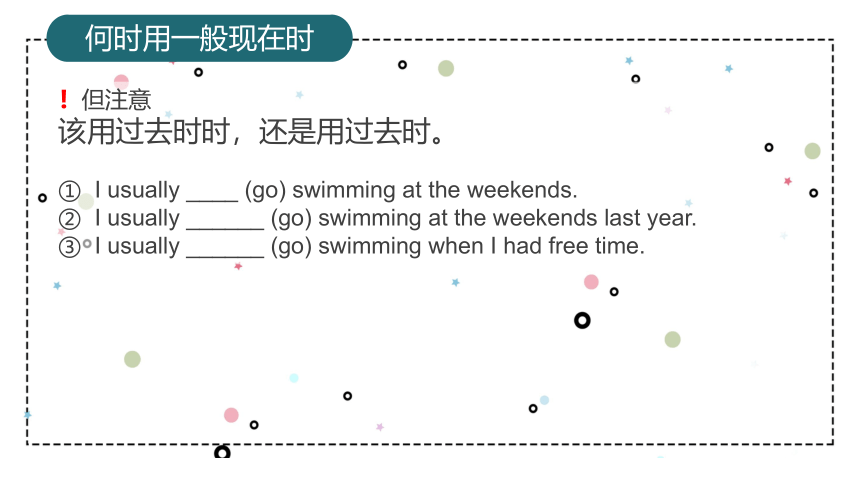
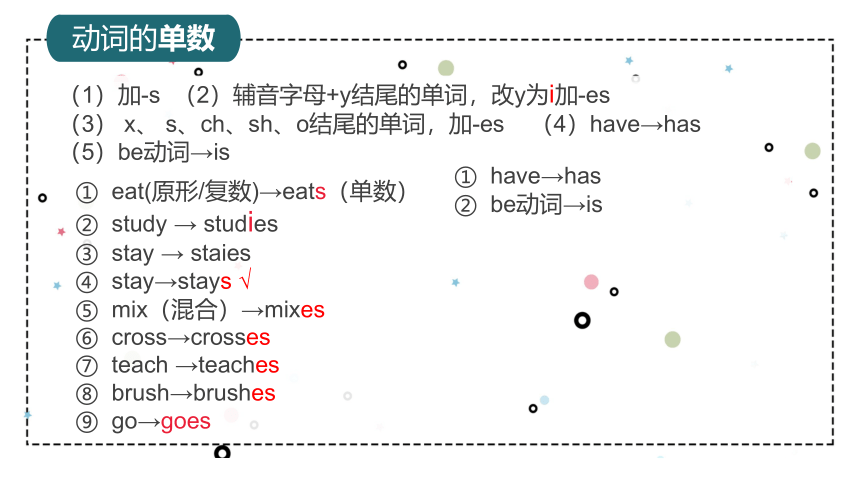
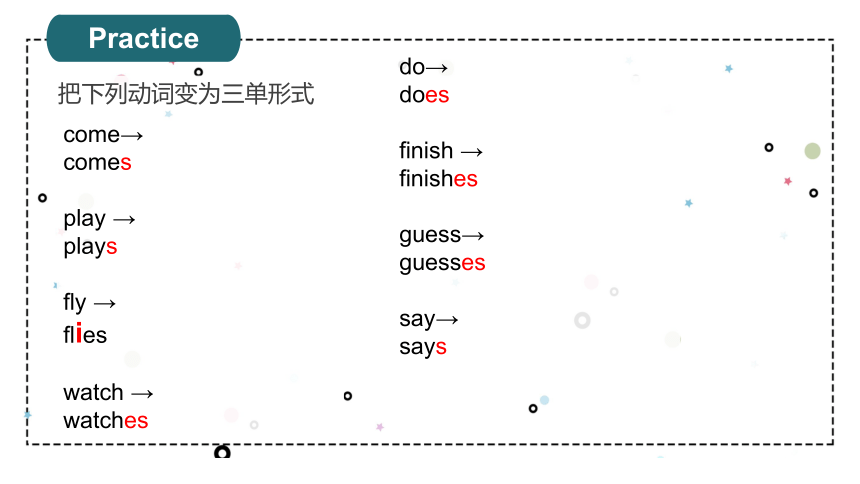
文档简介
(共18张PPT)
Unit 2 Grammar
The present simple tense
一般现在时
谓语动词为行为/实义动词时:
(1)~的原形(复数形式)或
(2) ~的单数(第三人称单数/三单),即加-s或-es。
2. 谓语动词为be动词am, is或are。
I get up at 6:30 every day.
My dad often walks after dinner.
I am a student.
My home is close to school.
My parents are young.
一般现在时的构成
表示经常性或习惯性发生的动作。
I get up at 6:30 every day.
My dad often walks after dinner.
2. 表示当下存在的状态
I am a student.
My home is close to school.
My parents are tall.
3. 表示客观真理。
The Sun is bigger than the Moon.
一般现在时的用法
何时用一般现在时
看到下面这些表频率的词时,用一般现在时:
1. 频率副词:always, usually, often, sometimes, seldom, never
I often ______ (play) basketball after school.
He often ______ (play) basketball after school.
I seldom ______ (go) swimming.
He seldom ______ (go) swimming.
2. every + day/week/month/year
I ____ (read) books every day.
I ____ (read) books every day.
3. once a week, twice a week, three times a week
I ________ (brush) my teeth twice a day.
He ________ (brush) his teeth twice a day.
何时用一般现在时
但注意
该用过去时时,还是用过去时。
I usually ____ (go) swimming at the weekends.
I usually ______ (go) swimming at the weekends last year.
I usually ______ (go) swimming when I had free time.
动词的单数
eat(原形/复数)→eats(单数)
study → studies
stay → staies
stay→stays √
mix(混合)→mixes
cross→crosses
teach →teaches
brush→brushes
go→goes
(1)加-s (2)辅音字母+y结尾的单词,改y为i加-es
(3) x、 s、ch、sh、o结尾的单词,加-es (4)have→has
(5)be动词→is
have→has
be动词→is
Practice
come→
comes
play →
plays
fly →
flies
watch →
watches
把下列动词变为三单形式
do→
does
finish →
finishes
guess→
guesses
say→
says
Practice
He usually _____ (eat) breakfast at 8 am.
Tom ______ (study) at night.
He often _____ (stay) home when it rains.
My dad ______ (brush) teeth twice a day.
He _____ (fly) to Shanghai every year.
He usually _______ (finish) homework before 9:30 pm.
He ____(have) many books.
He ____(sing) and plays the guitar well.
My mother____(do) the housework every day.
Tom usually____(watch)TV in the evening.
何时用动词单数
看主语。当主语为:
(1)他她它 (2)可以换成“他她它”的词
(3)不可数名词
(4)this和that (5)不定代词,如somebody
He gets up at 7 am every day.
My father gets up at 7 am every day.
The water tastes sweet.
This sounds funny.
That sounds funny.
Everyone likes the movie.
Practice
It often ______ (rain) a lot in summer in Guangzhou.
The air in the classroom _______ (smell) bad.
The music ______ (sound) exciting.
Nobody ______ (want) to play with me.
This ______ (taste) good.
一般现在时的否定句
肯定句:
He is a student.
否定句:
He is not a student.
He isn’t a student.
肯定句:
They are students.
否定句:
They are not students.
They aren’t students.
有be动词时,直接在be动词(am、is、are)后加not
肯定句:
I am a student.
否定句:
I am not a student.
I amn’t a student. ×
一般现在时的否定句
肯定句:I live close to school.
否定句:I don’t close to school.
肯定句:He lives close to school.
否定句:He doesn’t live close to school.
肯定句:We live close to school.
否定句:We don’t live close to school.
无be动词时,补助动词don’t(复数)或doesn’t(单数)+ 动词原形
Practice
He is my father. (改为否定句)
He isn’t my father.
I likes swimming. (改为否定句)
I don’t like swimming.
He likes swimming. (改为否定句)
He don’t like swimming.
He doesn’t likes swimming.
He doesn’t like swimming.
有be动词时,直接在be动词(am、is、are)后加not
无be动词时,补助动词don’t(复数)或doesn’t(单数)+ 动词原形
The air smells good. (改为否定句)
The air doesn’t smell good.
They like swimming. (改为否定句)
They doesn’t like swimming.
They don’t like swimming.
一般现在时的一般疑问句
原句有be动词时,把be动词提到句首
肯定句:He is a student.
一般疑问句:他是一名学生吗?
Is he a student
肯定句:They are students.
一般疑问句:他们是学生吗?
Are they students
一般现在时的一般疑问句
原句无be动词时:
(1)补助动词Do(复数)或Does(单数)
(2)后面动词改为原形(三单从后面动词转移到does)
肯定句:He lives close to school.
一般疑问句:他住在学校附近吗?
Does he live close the school
肯定句:They live close to school.
一般疑问句:他们住在学校附近吗?
Do they live close to school
一般现在时的一般疑问句
My father is a doctor. (改为一般疑问句)
你爸爸是一名医生吗?
Is your father a doctor
My father has a car. (改为一般疑问句)
Do your father have a car
Does your father has a car
Does your father have a car
原句有be动词时,把be动词提到句首
原句无be动词时,补Do(复数)或Does(单数),后面动词改原形
They love sports. (改为一般疑问句)
Does they love sports
Do they love sports
He goes to school on foot.
Do he go to school on foot
Does he goes to school on foot
Does he go to school on foot
01.上节课回顾
02.概念理解
03.实践训练
04.课堂总结
目录
行业PPT模板http:///hangye/
上节课回顾
Copy paste fonts. Choose the only option to retain text.
-
2029.07
Unit 2 Grammar
The present simple tense
一般现在时
谓语动词为行为/实义动词时:
(1)~的原形(复数形式)或
(2) ~的单数(第三人称单数/三单),即加-s或-es。
2. 谓语动词为be动词am, is或are。
I get up at 6:30 every day.
My dad often walks after dinner.
I am a student.
My home is close to school.
My parents are young.
一般现在时的构成
表示经常性或习惯性发生的动作。
I get up at 6:30 every day.
My dad often walks after dinner.
2. 表示当下存在的状态
I am a student.
My home is close to school.
My parents are tall.
3. 表示客观真理。
The Sun is bigger than the Moon.
一般现在时的用法
何时用一般现在时
看到下面这些表频率的词时,用一般现在时:
1. 频率副词:always, usually, often, sometimes, seldom, never
I often ______ (play) basketball after school.
He often ______ (play) basketball after school.
I seldom ______ (go) swimming.
He seldom ______ (go) swimming.
2. every + day/week/month/year
I ____ (read) books every day.
I ____ (read) books every day.
3. once a week, twice a week, three times a week
I ________ (brush) my teeth twice a day.
He ________ (brush) his teeth twice a day.
何时用一般现在时
但注意
该用过去时时,还是用过去时。
I usually ____ (go) swimming at the weekends.
I usually ______ (go) swimming at the weekends last year.
I usually ______ (go) swimming when I had free time.
动词的单数
eat(原形/复数)→eats(单数)
study → studies
stay → staies
stay→stays √
mix(混合)→mixes
cross→crosses
teach →teaches
brush→brushes
go→goes
(1)加-s (2)辅音字母+y结尾的单词,改y为i加-es
(3) x、 s、ch、sh、o结尾的单词,加-es (4)have→has
(5)be动词→is
have→has
be动词→is
Practice
come→
comes
play →
plays
fly →
flies
watch →
watches
把下列动词变为三单形式
do→
does
finish →
finishes
guess→
guesses
say→
says
Practice
He usually _____ (eat) breakfast at 8 am.
Tom ______ (study) at night.
He often _____ (stay) home when it rains.
My dad ______ (brush) teeth twice a day.
He _____ (fly) to Shanghai every year.
He usually _______ (finish) homework before 9:30 pm.
He ____(have) many books.
He ____(sing) and plays the guitar well.
My mother____(do) the housework every day.
Tom usually____(watch)TV in the evening.
何时用动词单数
看主语。当主语为:
(1)他她它 (2)可以换成“他她它”的词
(3)不可数名词
(4)this和that (5)不定代词,如somebody
He gets up at 7 am every day.
My father gets up at 7 am every day.
The water tastes sweet.
This sounds funny.
That sounds funny.
Everyone likes the movie.
Practice
It often ______ (rain) a lot in summer in Guangzhou.
The air in the classroom _______ (smell) bad.
The music ______ (sound) exciting.
Nobody ______ (want) to play with me.
This ______ (taste) good.
一般现在时的否定句
肯定句:
He is a student.
否定句:
He is not a student.
He isn’t a student.
肯定句:
They are students.
否定句:
They are not students.
They aren’t students.
有be动词时,直接在be动词(am、is、are)后加not
肯定句:
I am a student.
否定句:
I am not a student.
I amn’t a student. ×
一般现在时的否定句
肯定句:I live close to school.
否定句:I don’t close to school.
肯定句:He lives close to school.
否定句:He doesn’t live close to school.
肯定句:We live close to school.
否定句:We don’t live close to school.
无be动词时,补助动词don’t(复数)或doesn’t(单数)+ 动词原形
Practice
He is my father. (改为否定句)
He isn’t my father.
I likes swimming. (改为否定句)
I don’t like swimming.
He likes swimming. (改为否定句)
He don’t like swimming.
He doesn’t likes swimming.
He doesn’t like swimming.
有be动词时,直接在be动词(am、is、are)后加not
无be动词时,补助动词don’t(复数)或doesn’t(单数)+ 动词原形
The air smells good. (改为否定句)
The air doesn’t smell good.
They like swimming. (改为否定句)
They doesn’t like swimming.
They don’t like swimming.
一般现在时的一般疑问句
原句有be动词时,把be动词提到句首
肯定句:He is a student.
一般疑问句:他是一名学生吗?
Is he a student
肯定句:They are students.
一般疑问句:他们是学生吗?
Are they students
一般现在时的一般疑问句
原句无be动词时:
(1)补助动词Do(复数)或Does(单数)
(2)后面动词改为原形(三单从后面动词转移到does)
肯定句:He lives close to school.
一般疑问句:他住在学校附近吗?
Does he live close the school
肯定句:They live close to school.
一般疑问句:他们住在学校附近吗?
Do they live close to school
一般现在时的一般疑问句
My father is a doctor. (改为一般疑问句)
你爸爸是一名医生吗?
Is your father a doctor
My father has a car. (改为一般疑问句)
Do your father have a car
Does your father has a car
Does your father have a car
原句有be动词时,把be动词提到句首
原句无be动词时,补Do(复数)或Does(单数),后面动词改原形
They love sports. (改为一般疑问句)
Does they love sports
Do they love sports
He goes to school on foot.
Do he go to school on foot
Does he goes to school on foot
Does he go to school on foot
01.上节课回顾
02.概念理解
03.实践训练
04.课堂总结
目录
行业PPT模板http:///hangye/
上节课回顾
Copy paste fonts. Choose the only option to retain text.
-
2029.07
